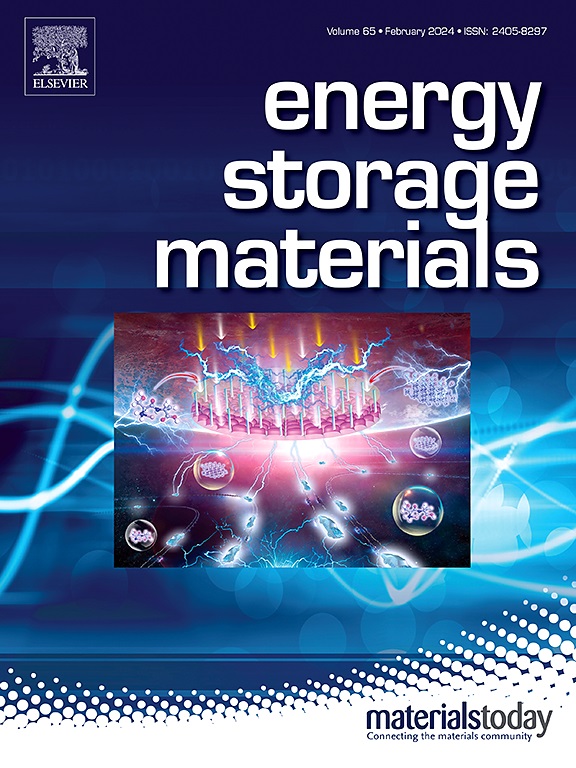Decoding battery aging in fast-charging electric vehicles: An advanced SOH estimation framework using real-world field data
IF 18.9
1区 材料科学
Q1 CHEMISTRY, PHYSICAL
引用次数: 0
Abstract
Accurately estimating the state of health (SOH) of in-vehicle batteries is critical for advancing electric vehicle (EV) technology. However, higher charging rates and more complex driving conditions have posed major challenges, with significant variations from vehicle-to-vehicle and cycle-to-cycle. In this study, we developed a SOH estimation framework to monitor battery capacity degradation, in EVs with multi-step constant-current fast charging and voltage balancing technology. The framework employs a customized data window approach, informed by a thorough analysis of EV charging behavior, and extracts hierarchical features from vehicle-, pack- and cell-levels for tracking battery aging. We collected real-world charging data from 300 pure EVs over 1.5 years, resulting in 193,180 samples for validation. The best-performing machine learning models achieved an absolute error of less than 2 % for 93.7 % of samples, a root mean square error (RMSE) of 1.05 %, and a maximum error of only 3.73 % whilst using only 30 % data for training. Our analysis indicates that the proposed model can be effectively developed without the need to pre-select vehicles based on specific driving habits or operating conditions. Notably, reliable and accurate estimations were produced using data from just one vehicle, achieving an RMSE of 1.82 %. Our results highlight the potential of user behavior-assisted feature engineering to decode battery pack aging under dynamically changing vehicle profiles. This work underscores the promise of developing accurate SOH estimation modules for battery management systems using minimal vehicle data.


解码快速充电电动汽车的电池老化:使用真实世界现场数据的先进 SOH 估算框架
准确估计车载电池的健康状态(SOH)对电动汽车技术的发展至关重要。然而,更高的充电费率和更复杂的驾驶条件带来了重大挑战,不同车辆和不同周期之间存在显著差异。在本研究中,我们开发了一个SOH估计框架,用于监测采用多步恒流快速充电和电压平衡技术的电动汽车电池容量退化。该框架采用定制的数据窗口方法,通过对电动汽车充电行为的全面分析,并从车辆、电池组和电池层面提取分层特征,以跟踪电池老化。我们收集了300辆纯电动汽车1.5年的真实充电数据,共收集了193,180个样本进行验证。表现最好的机器学习模型在93.7%的样本中实现了绝对误差小于2%,均方根误差(RMSE)为1.05%,最大误差仅为3.73%,而仅使用30%的数据进行训练。我们的分析表明,所提出的模型可以有效地开发,而无需根据特定的驾驶习惯或操作条件预先选择车辆。值得注意的是,仅使用一辆车的数据就产生了可靠和准确的估计,RMSE达到1.82%。我们的研究结果突出了用户行为辅助特征工程在动态变化的车辆轮廓下解码电池组老化的潜力。这项工作强调了利用最少的车辆数据为电池管理系统开发准确的SOH估计模块的前景。
本文章由计算机程序翻译,如有差异,请以英文原文为准。
求助全文
约1分钟内获得全文
求助全文
来源期刊

Energy Storage Materials
Materials Science-General Materials Science
CiteScore
33.00
自引率
5.90%
发文量
652
审稿时长
27 days
期刊介绍:
Energy Storage Materials is a global interdisciplinary journal dedicated to sharing scientific and technological advancements in materials and devices for advanced energy storage and related energy conversion, such as in metal-O2 batteries. The journal features comprehensive research articles, including full papers and short communications, as well as authoritative feature articles and reviews by leading experts in the field.
Energy Storage Materials covers a wide range of topics, including the synthesis, fabrication, structure, properties, performance, and technological applications of energy storage materials. Additionally, the journal explores strategies, policies, and developments in the field of energy storage materials and devices for sustainable energy.
Published papers are selected based on their scientific and technological significance, their ability to provide valuable new knowledge, and their relevance to the international research community.
 求助内容:
求助内容: 应助结果提醒方式:
应助结果提醒方式:


